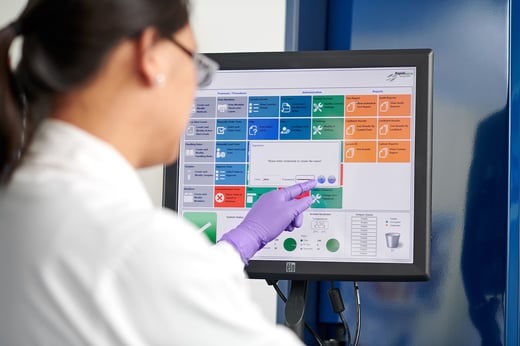blog
July 29, 2022 | Source: Rapid Micro Biosystems, Inc.
Helping 503Bs Meet the Challenge
POSTED BY Rapid Micro Biosystems | 7 minute read
July 29, 2022 | Source: Rapid Micro Biosystems, Inc.
POSTED BY Rapid Micro Biosystems | 7 minute read
How can drug compounders support critical patient needs, while facing down tough regulatory and business issues?

It has been nearly 10 years since Congress passed the Drug Quality and Security Act (DQSA), creating the 503B Outsourcing Facility designation for drug compounders who reformulate commercial medications used in healthcare settings. Although compounded medicines are regulated at the state level, the U.S. Food and Drug Administration (FDA) oversees manufacturing facilities to safeguard patients from contaminated or improperly compounded products. 503B pharmacies are thus subject to routine FDA inspection – and many struggle to comply, even as they face business challenges that have kept the industry in flux.
The role of 503B compounders, also called outsourcing facilities (OFs), is to reformulate drugs into appropriate strengths, dosages, and formats for use in settings such as hospitals, clinics, or physician’s offices. According to FDA, the 503B market included 76 outsourcing facilities in 23 states by the end of 2019, with total revenues between $2.3 billion and $4.6 billion. Most of the sector is inhabited by young companies, with new entrants barely keeping pace with those exiting the market as of January 2021.
Why do so many companies exit the market? Compliance is a key reason. Federally issued 483s, warning letters, and state referral letters have forced a number of 503B compounders to recall products, shut down operations, or shutter facilities permanently. Particularly challenging is environmental monitoring (EM), given FDA’s strict guidelines on insanitary conditions at compounding facilities.
There are also other challenges. FDA notes that outsourcing facilities can struggle with:
With compliance, data integrity, and operational flexibility all at a premium, our Growth Direct® System can make it easier for 503B compounders to respond effectively.
An overarching goal for compounders is to take control of their manufacturing and quality control process, demonstrating ability to de-risk their business. This means improving operating procedures while confirming the results with appropriate quality control testing and data integrity systems. An important example is EM testing, because 503B companies striving to operate cGMP facilities will typically see EM test volume rise as they pursue more small-batch drug manufacturing.
Our validated Growth Direct® System can help to manage expanded EM testing successfully for compounders under pressure to upgrade air, surface, and personnel monitoring at their facilities. It replaces traditional manual procedures with robotic automation, optical imaging, algorithmic vision analysis, and data management to provide fast, accurate enumeration and digitization, testing up to 660 samples at a time. This can result in:
 Designed to be compliant with the needs of 21 CFR Part 11 and cGMP guidelines, the Growth Direct® System can help 503B firms establish the audit trails, accurate reporting, and detailed ALCOA/ALCOA+ principles needed to withstand regulatory scrutiny.
Designed to be compliant with the needs of 21 CFR Part 11 and cGMP guidelines, the Growth Direct® System can help 503B firms establish the audit trails, accurate reporting, and detailed ALCOA/ALCOA+ principles needed to withstand regulatory scrutiny.
Equally important, our experienced support team has successfully validated the Growth Direct® System at multiple customer sites since 2015, with a track record that includes cGMP processes for environmental monitoring and water testing through internal change control procedures. Even if your 503B hasn’t had the time or resources to develop regulatory expertise in-house, we can help you stay on top of guidelines such as these.
| Date | Organization | Type | Publication Name |
| 11/6/2020 | FDA | Final Guidance | Insanitary Conditions at Compounding Facilities |
| 1/22/2020 | FDA | Revised Draft Guidance | Current Good Manufacturing Practice - Guidance for Human Drug Compounding Outsourcing Facilities |
| 12/1/2019 | USP | General Chapter | <800> Hazardous Drugs - Handling in Healthcare Settings |
| 3/1/2019 | FDA | Final Guidance | Evaluation of Bulk Drug Substances Nominated for Use in Compounding Under Section 503B of the Federal Food, Drug, and Cosmetic Act |
Today’s 503B compounding companies must quickly adapt to expanding quality guidance standards and intensifying inspections, removing sources of risk and variability in their operations and the QC lab. Simply put, non-compliance is not an option.
Why not get in touch with Rapid Micro Biosystems today? Upgrading your current operations to include a modern EM program can minimize the risk of contamination and insanitary conditions, while enhancing compliance. Implementing that kind of formula can make a healthy difference for you – and for patients.
Determination and Comparison of Time-To-Results Across Global Sites for EM Media via RMM
U.S. Food and Drug Administration Compounding Quality Center of Excellence
State of the Outsourcing Facility Sector and Possibilities for the Future